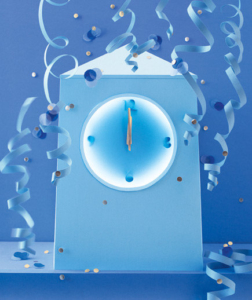Every January 1, likely, you make a resolution. By February 1, you may already have blown it. Let this be the year your resolution sticks. Here’s how.
By Alexandra Kay, Shared from RealSimple.com
 You’ve made a New Year’s resolution? Congratulations: Research says you’re 10 times more likely to successfully alter a behavior than you would if you didn’t make a start-of-the-year vow. And maybe that’s why some 45 percent of American adults ring in the New Year with a resolution.
You’ve made a New Year’s resolution? Congratulations: Research says you’re 10 times more likely to successfully alter a behavior than you would if you didn’t make a start-of-the-year vow. And maybe that’s why some 45 percent of American adults ring in the New Year with a resolution.
But will they keep it? According to statistics, almost half will give up on their goals within six months. Avoid being one of them. No matter what you’ve vowed—to lose weight? get fit? save money?—these four tips will help you achieve your goal.
Be Specific
Vague goals won’t work. “You’ve got to develop a specific action plan for change,” says John Norcross, Ph.D., coauthor of Changeology: 5 Steps to Realizing Your Goals and Resolutions ($25, amazon.com). Map out your strategy before New Year’s arrives. If you want to lose weight, target a precise number of pounds to shed, then set concrete mini-goals and the dates on which you aim to accomplish each of them. Want to save money? Determine the amount you will put aside each month and identify explicit changes in behavior you’ll make to get there, whether that means skipping your afternoon latte or carpooling to work to save on fuel costs.
Make Your Goal Public
Share your decision to change with friends and family who can offer support when you’re wavering and encouragement when you’re doing well at sticking to your resolution. “Public commitments are generally more successful than private decisions,” says Norcross.
Substitute Good Behaviors for “Bad”
Don’t rely on willpower alone to help you change, advises Norcross. That approach won’t work. Instead, build in a healthy behavior that’s incompatible with the one you want to change. So if eating your usual midafternoon treat runs contrary to your goal of dropping a few pounds, put together a small like-minded group and commit to taking a quick, brisk walk at your normal snack time. Each time you put the brakes on “bad” behavior, you’ll increase your confidence in your ability to make the change.
Track Your Progress
Record or chart your changed behavior. “Research indicates that such ‘self-monitoring’ increases the probability of keeping your resolution,” says Norcross.
Ready to make your plan? Here are more specific tips on:


